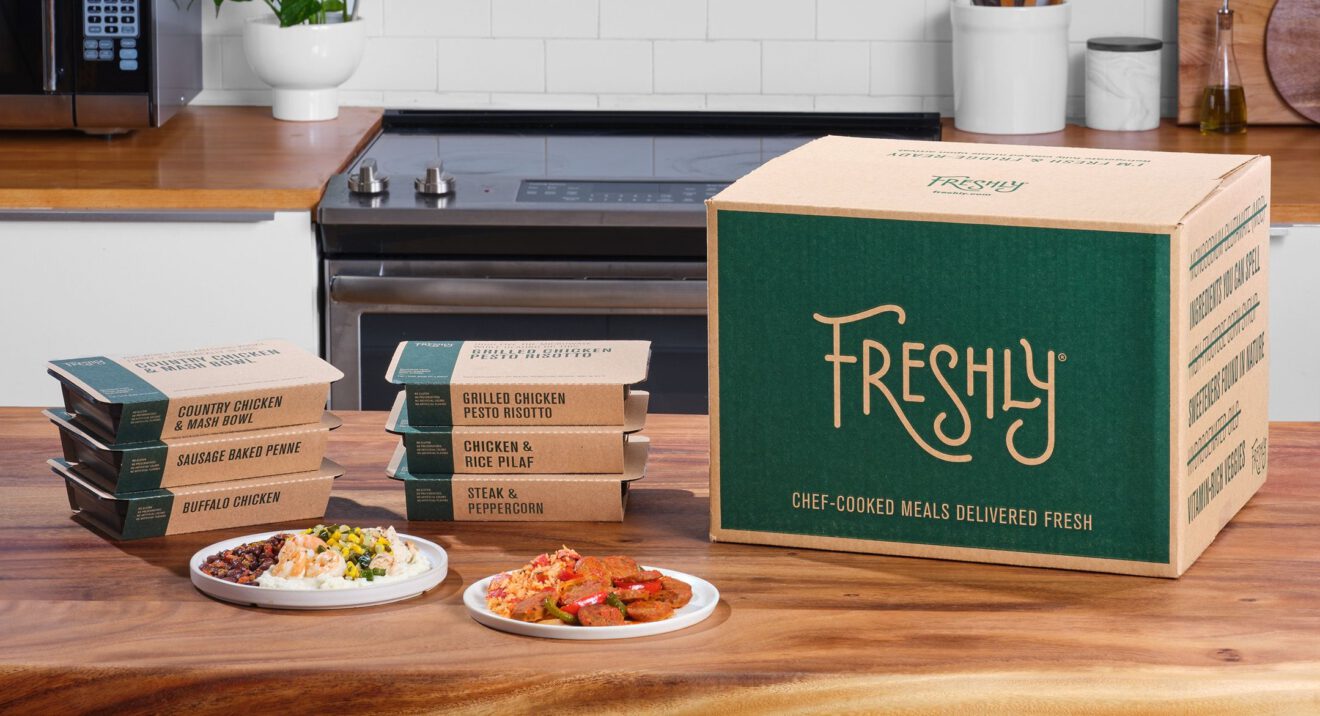As food retailers struggled to keep shelves stocked and consumers increasingly turned to online grocery shopping at the start of the US coronavirus outbreak, the meal kit industry also saw a swell in demand for their services. As many consumers were homebound due to lockdown orders, home cooking became a popular and necessary trend. Meal kit companies address many consumer concerns during the pandemic, including prepared food options for large or small families, consistent food access and minimal- to no-contact delivery methods.
Subscriptions soar as consumers stay home
Since the start of the pandemic, meal kit companies have surged in popularity with HelloFresh, Freshly and Sun Basket reporting high demand for their subscription services. Active US customers of HelloFresh grew 90% in the first quarter of 2020 compared to the same period last year, according to a company spokesperson. Freshly delivered 4.2 million meals in March, up from 3.5 million in February, while 20% of users also increased their weekly plans from six to nine meals, said Michael Wystrach, founder and CEO of Freshly. Sun Basket Senior Vice President of Growth Vanessa Meyers noted the company has experienced twice the demand it had before the pandemic from both existing and new subscribers.
The accelerated growth of Freshly is partly attributed to a doubling of customers 60 years old and above, which now make up 60% of its user base due to baby boomers being “forced to shift to living in a digital world in quarantine,” said Wystrach.
With these services receiving high interest right now due to stay-at-home orders, customer retention is key. Sun Basket is focused on meeting needs and desires now and adjusting business to keep its users.
“While delivering delicious meals is our priority, we are also constantly innovating and adapting our offerings taking into consideration feedback from our customers, to offer them options to better fit their ever-changing, busy lifestyles,” said Meyers.
Wystrach echoed the need for adaptability at Freshly, especially during the pandemic: “This is new for everyone in the industry so we continue to learn, talk to other operators and adopt best practices rapidly.”
Another way to retain customers is a focus on sustainability. More consumers are striving to make ethical choices for the planet while still enjoying the convenience and quality that meal kits offer.
“Our investments in technology, infrastructure and our brand have paid off, allowing us to focus on providing a variety of product options, innovating on packaging and materials throughout our supply chain to become more sustainable, and demonstrating that meal kits can be both a sustainable and profitable business model,” said a HelloFresh spokesperson.
Prioritizing supply chain strength, safety precautions
While food manufacturers have faced major challenges in keeping products stocked at groceries, these meal kit companies have reported minimal supply chain disruption despite increased demand. They cited regular communication with distributors and suppliers and the strength of their supply chains pre-pandemic as some of the reasons why interruption was limited for the industry.
Another challenge for consumers since the pandemic hit has been adhering to social distancing rules while making essential outings such as grocery shopping. Meal kit services can reduce these trips with no-contact delivery options becoming more common. HelloFresh, Freshly and Sun Basket took federal guidelines on food and employee safety very seriously, and all three companies quickly pivoted to accommodate increased sanitization, providing personal protective equipment for employees and frequent health checks.
Will meal kit popularity last beyond lockdown?
As states reopen public spaces, many consumers have started to eat out at restaurants again. However, many meal kit services believe that the trend of home cooking is likely to remain during the lifting of restrictions and even after the pandemic.
“We expect many consumer habits formed during the pandemic, like cooking and at-home eating, to continue in a post-pandemic world,” said a HelloFresh spokesperson. “Meal kits offer a more convenient, sustainable and affordable dinner solution for home-cooked meals than a supermarket can, and we expect meal kits to continue filling this need for fresh ingredients delivered to your doorstep.”
Sun Basket also expects new habits to stick, but with some consumers experiencing cooking fatigue, the brand’s Oven-Ready meals are a solution while still providing a quality meal in only 6 minutes. “[C]ustomers may no longer want to spend time planning out meals for the week, buying ingredients, prepping and cleaning up,” Meyers elaborated.
“While there are those who will return to their pre-COVID-19 grocery shopping and dining habits, we also anticipate those consumers who will stay loyal to the brands that helped them through this challenging time,” said Freshly’s Wystrach.
Related stories:
- Restaurant reopenings require balance between reassuring diners, reinforcing rules
- Mandated to stay at home, cooking fatigue sets in
- Why food brands should continue to work with influencers during the pandemic
_____________________________________
If you enjoyed this article, you can sign up for Consumer Brands SmartBrief or Restaurant SmartBrief to get news like this in your inbox. For even more great news content, sign up for any of SmartBrief’s 275+ free email newsletters today, free.
